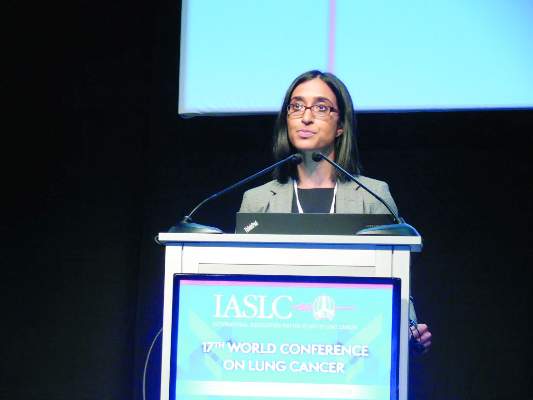AT WCLC 2016
VIENNA (FRONTLINE MEDICAL NEWS) – The two subclasses of immune checkpoint inhibitor drugs showed very little basis for choosing between them by either efficacy or toxicity in a systematic review of 23 trials run in patients with non–small cell lung cancer during 2013-2016.
For efficacy, inhibitors of the programmed death (PD-1) receptors had a 19% overall response rate when averaged from 12 different trials with 3,284 patients on one of these drugs. The PD-ligand 1 (PD-L1) inhibitors produced a 17% overall response rate in 11 trials with 2,615 patients on one of the drugs, a between-class efficacy difference that was not statistically significant, Rathi N. Pillai, MD , said at the World Conference on Lung Cancer, sponsored by the International Association for the Study of Lung Cancer.
In the safety analysis, the PD-1 and PD-L1 subclasses had statistically insignificant differences in the total rate of adverse effects (72% with PD-1 inhibitors and 65% with the PD-L1 inhibitors), virtually identical rates of higher-grade adverse events, and also very similar rates of the most common adverse events. The most common adverse event was fatigue, which affected 19% of patients on a PD-1 inhibitor and 21% of patients on a PD-L1 inhibitor, reported Dr. Pillai, a medical oncologist at Emory University, Atlanta. The two subclasses also showed very similar rates of the next most common adverse events, diarrhea and rash.
Immune-related adverse events were significantly more common in the patients treated with PD-1 inhibitors: 16%, compared with 11% in the PD-L1 inhibitor-treated patients (P = .04). The two subclasses also showed a trend toward a difference in the most common immune-related adverse event, hypothyroidism, with an incidence of 6.7% with PD-1 inhibitors and 4.2% with PD-L1 inhibitors (P = .07). The two sets of patients showed a statistically significant difference in the next most common immune-related adverse event, pneunomitis, 4.0% with PD-1 inhibitors and 2.0% with PD-L1 inhibitors (P = .02).
The trials with PD-1 inhibitors included nivolumab (Opdivo) and pembrolizumab (Keytruda). The trials with PD-L1 inhibitors included atezolizumab (Tecentriq), durvalumab, and avelumab. The total rate of all adverse events was highest among patients on nivolumab, 76%, and lowest among patients on durvalumab, 61%.
On Twitter @mitchelzoler



